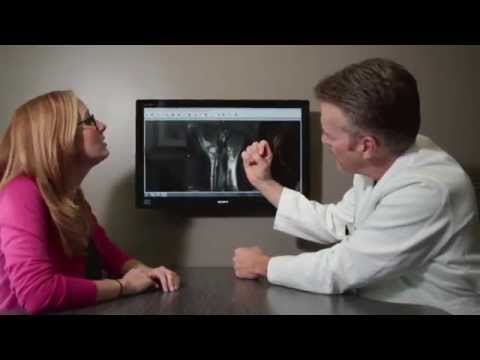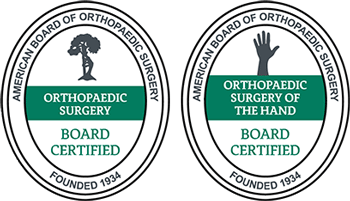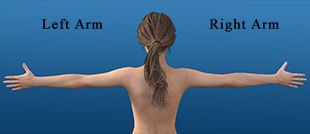Cervical Radiculopathy
Contents
- 1 What is Cervical Radiculopathy?
- 2 What causes Cervical Radiculopathy?
- 3 What are the symptoms of Cervical Radiculopathy?
- 4 How is Cervical Radiculopathy diagnosed?
- 5 How is Cervical Radiculopathy treated?
- 6 How can Dr. Knight help you with Cervical Radiculopathy?
- 7 Cervical Radiculopathy Fact Sheet
- 8 Frequently asked Questions:
- 9 Animated Videos
What is Cervical Radiculopathy?
Nerve fibers carry signals from one part of the body to another. Nerves extend down from the brain though the spinal column to various parts of the body. They transmit information that is interpreted into sensation and movement. When a cervical nerve exits the cervical spine and becomes irritated or compressed this is referred to as Cervical Radiculopathy or a “pinched nerve”.
What causes Cervical Radiculopathy?
Any condition in which a cervical nerve becomes injured, inflamed, or compressed can result in Cervical Radiculopathy. In middle aged or older populations, the most common causes include cervical stenosis, degenerative disc disease and bone spurs. In younger people a herniated disc of the cervical spine or trauma are common culprits. Cervical stenosis and degenerative disc disease are progressive conditions that happen over time and can cause a cervical nerve to become pinched due to deterioration of the spinal canal or cervical bones. Disc herniation often occurs because of strenuous lifting, pulling or twisting movements. If the herniated disc bulges into the spinal canal it can put pressure on a cervical nerve root leading to Cervical Radiculopathy.
What are the symptoms of Cervical Radiculopathy?
Symptoms of Cervical Radiculopathy can vary depending on the specific cervical nerve involved however, pain is usually the primary concern. Although the condition occurs in the spine, the radiating pain can be felt in the tissues though which the nerve passes. In general, this pain may radiate from the neck outward to the shoulder, arm, wrist or hand (most common).
Some patients describe the pain as shooting, like an electrical current, while others report a sharp burning sensation, or even a dull ache. In some cases, neck and arm movements can increase or decrease the severity of the pain.
Headaches are common, and numbness or tingling may be present. Some clients report muscle weakness in the affected extremity.
How is Cervical Radiculopathy diagnosed?
Diagnosis begins by reviewing a detailed medical history and associated symptoms. Your physician will perform a thorough examination looking for changes in reflexes, sensation, or muscle weakness. The neck, shoulder, arms and hands may be manipulated to determine what increases or decreases pain. The doctor may order tests such as X-rays, computed tomography (CT), Magnetic Resonance Imaging (MRI) or electromyography (EMG) to survey internal structure and nerve conduction.
How is Cervical Radiculopathy treated?
Most patients do not require treatment for Cervical Radiculopathy. For some, the pain dissipates quickly in a matter of days, while for others it may take a few weeks or longer. In cases where the pain does not improve or is particularly severe treatment may be required.
Non-Surgical
The specific course of treatment depends on the underlying cause. Physical therapy and exercise can increase flexibility and mobility of the affected extremity. Ice or heat may be used to aid in the reduction of pain and inflammation. Non-steroidal anti-inflammatory agents (NSAIDs) like ibuprofen or naproxen and pain relievers such as acetaminophen may also help. Your physician may prescribe muscle relaxants, oral steroids, or narcotics. A soft cervical collar may also be recommended to improve alignment and stabilize the neck.
Surgical
Surgery may be indicated if conservative measures fail to adequately relieve pain or if symptoms worsen. The precise surgery required depends on the specific cause of the Cervical Radiculopathy. In general, the procedure consists of decompressing the nerve root and fusion of the involved cervical vertebra. It should be noted that surgical decompression to relieve arm and hand pain is much more reliable than the surgery for neck pain.
How can Dr. Knight help you with Cervical Radiculopathy?
Dr. Knight welcomes you to any of our Dallas Fort-Worth accessible hand and wrist offices. Dr. Knight is an accomplished hand specialist. Come to our Southlake office or Dallas office today and bring life back to your hands.
Cervical Radiculopathy Fact Sheet
| What is Cervical radiculopathy? | Cervical radiculopathy is the result of a pinching of certain nerves in the neck that radiates down into the arms and causes pain and discomfort. A hernation of a disc in the cervical spine is often behind the condition in younger sufferers. |
| Can I manage Cervical radiculopathy on my own? | Cervical radiculopathy can be caused by a series of conditions that require medical intervention in order to be treated. |
| What sorts of medications are affective in treating Cervical radiculopathy? | Cervical radiculopathy can be treated with anti-inflammatories as well as pain relievers. Muscle relaxants, oral steroids, and even narcotics may also become necessary in more serious examples of the condition. |
| What are some possible consequences if I don't see a doctor to treat my Cervical radiculopathy? | If untreated, the nerve impingment responsible for the condition will not improve, and more than likely it will get worse over time, so tis condition can become permanent if steps are not taken to reverse or stall its progress. |
| What is the preferred treatment for Radiculopathy? | Non-surgical treatments include medications and immobilization, as well as physical therapy. If these fail or symptoms worsen then surgery may be necessary. |
Frequently asked Questions:
Is Cervical Radiculopathy curable?
Cervical Radiculopathy is a complicated condition, because while it originates with a pinched nerve in the spine, the pain that is caused by this nerve impingement radiates throughout the body and wherever the affected nerve goes within the tissue, the pain is found there as well. That being said, once the nerve responsible for the pain is located and a plan of treatment is agreed upon by the doctor or doctors involved in your treatment, treatment is highly effective and you can easily be relieved of the pain that brought you to seek treatment in the first place.
How do I know if I have Cervical Radiculopathy?
Cervical radiculopathy is typified by pain, and so if you suffer from the condition, you can’t possibly miss the symptoms. A pinched nerve in the neck is a very noticeable, and while you may not be able to determine the precise root of the pain, because of the radiating nature of the condition, your physician will conduct a thorough and in depth evaluation of your nerve responses, and also likely take imaging studies, which can give a better view of the internal workings and help determine the precise nature of the nerve impingement.
Is Cervical Radiculopathy painful?
Cervical Radiculopathy is painful, and pain is the central diagnostic feature of the condition. While the severity of the condition can vary, by the time an individual who suffers from the condition seeks medical treatment, odds are that the pain they suffer is severe.
Can I see a chiropractor to treat Cervical Radiculopathy?
One of the conservative methods of treatment is to isolate the cervical vertebrae where the nerve impingement occurs and keep them steady using a collar so that they will realign themselves and the nerves will then no longer be pinched by bones that aren’t in the correct position. A chiropractor may be able to assist in this realignment, but in order to avoid any complications or other damage that might occur as a result of spinal manipulation, it is important to undergo all treatment under the supervision of a physician who is trained to recognize and interpret all of the symptoms of the condition, both internal and external.
Animated Videos
Disclaimer
HandAndWristInstitute.com does not offer medical advice. The information presented here is offered for informational purposes only. Read Disclaimer

























